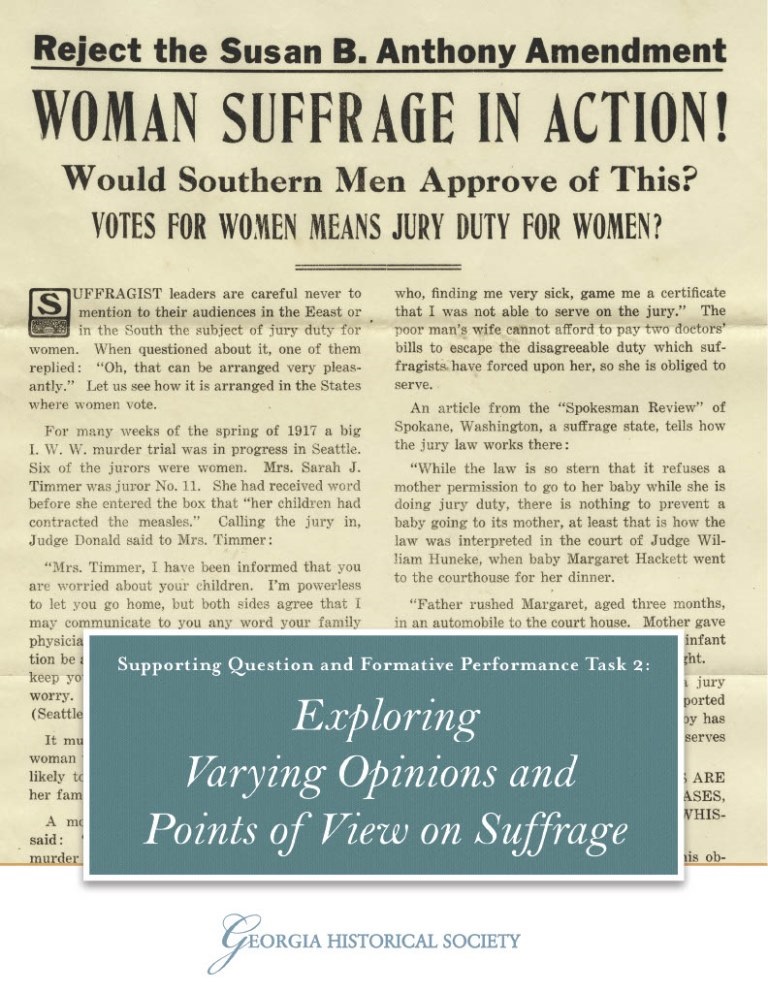Women’s Suffrage, why teach it?
Each year, GHS selects a person or topic that made a great impact on Georgia’s history as the focus of educational programs and resources for the Georgia History Festival (GHF). The 2019-2020 focus of study is “Women’s Suffrage at 100: The 19th Amendment and Georgia History” and explores the legacy of women’s suffrage in Georgia and the United States in commemoration of the struggle to pass the 19th Amendment in which women won the right to vote 100 years ago.
All K-12 educational programming and resources created by GHS are aligned to the Georgia Standards of Excellence with the goal of providing relevant, engaging, and usable strategies for primary source exploration in the classroom.
This year’s GHF theme is not one well represented in the Georgia Standards of Excellence (GSE) for any grade. That fact begs the question—why teach about this topic? There are many answers to that question!
- Timing: In the centennial year marking the passage and ratification of the 19th Amendment, GHS has chosen to commemorate the decades-long struggle for women to gain the right to vote.
- Looking Ahead: As one of the most important events of the 20th century, the passage of the 19th Amendment marked the culmination of an extensive struggle for women to achieve full citizenship. Looking towards the 250th anniversary of the formation of the United States in 2026, GHS is committed to exploring the ever-changing nature of American citizenship and what it means to be ‘American.’
- Sticking to the Standards: This year’s new GHF classroom-ready project box titled “Winning the Vote: Women’s Suffrage in Georgia” is a historical inquiry filled with primary sources and strategies aimed at examining the New South era—the era following Reconstruction in Georgia—through the lens of voting rights. The project box materials are aligned to the GSE for 8th grade Georgia Studies: SS8H7Evaluate key political, social, and economic changes that occurred in Georgia during the New South Era.
- Relevant to Georgia: GHS employs inquiry-based strategies in educational resources to help engage students by tapping into their own observations, reflections, and questions about Georgia History. The “Winning the Vote: Women’s Suffrage in Georgia” project box leads teachers and students to form questions and gather evidence from primary and secondary sources from the New South era to today—ultimately building an argument to respond to the question: How has the fight for women’s suffrage impacted Georgia?
- Elevating Multiple Perspectives: In accordance with the 19th Amendment Centennial Value Statement by the American Association for State and Local History (AASLH), GHS educational resources and programs reflect the principle of “elevating multiple perspectives” to teach this year’s GHF In order to help teachers and students explore the nuanced, complex, and diverse history of the struggle for suffrage in this state, all GHF educational resources and programming rely on primary sources that highlight varying opinions, points of view, and levels of participation within the women’s rights movement in Georgia such as African-American women, anti-suffrage campaigners, and perspectives from local and national players.
Classroom Connections for Georgia Studies blog series is written by GHS Education Coordinator Lisa Landers and is designed to help teachers and other educational professionals become familiar with and use new educational resources and materials created by GHS for the annual Georgia History Festival. Lisa can be reached by email at llanders@georgiahistory.com.

